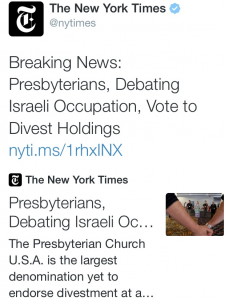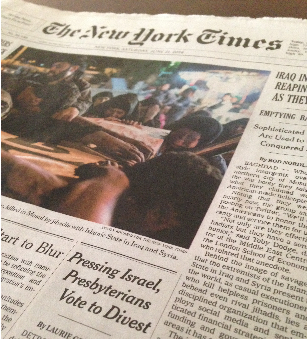The Presbyterian Divestment Vote – What you haven’t heard – Noushin Darya Framke

“Presbyterians Vote to Divest Holdings to Pressure Israel”
Much has been said and written about the Presbyterian Church’s vote to divest from Israel’s occupation. I have just finished serving six years on the Presbyterian Church’s MRTI Committee, Mission Responsibility Through Investment, which is the group that has been involved in corporate engagement with Caterpillar, Hewlett-Packard, and Motorola Solutions. After several years of failed engagement with these companies regarding their involvement in human rights violations, our committee recommended divestment as a last resort.
In late June in Detroit this year, MRTI’s recommendation reached the plenary floor of the Presbyterian General Assembly for debate. It was a long time coming, and it went on for over three hours. If you were watching online or in the hall, you already know that fear was a major player in the proceedings; fear of how a vote to divest would be perceived by the “outside world.” For this reason, language was added to the resolution to shore up our long-standing support for the state of Israel, to distance ourselves from the global “BDS Movement” (Boycott, Divestment, and Sanctions), and to assuage concerns of various American Jewish groups – which are far from monolithic. Painfully little was said about the suffering of Palestinians under a 47-year occupation.
From MRTI’s perspective, we recommended divestment as a matter of stewardship. The Presbyterian Foundation and the Board of Pensions of the Presbyterian Church (U.S.A.) are responsible for nearly $9 billion, which as a church, we seek to invest according to socially responsible investment (SRI) guidelines. The SRI arena is now a full-fledged movement with many outlets and options for funds that meet the criteria. This SRI arena did not exist before the 1970s when the struggle for dismantling the apartheid system in South Africa started gaining ground. The Presbyterian Church had a significant role in that success through the work of MRTI. It is a proud legacy that is humbling for someone like me who served on MRTI over the last six years, with the full knowledge of what was accomplished in the 1980s.
As one who was involved in the talks with Caterpillar Inc., Hewlett-Packard, and Motorola Solutions, and represented my denomination in these talks, I would like my fellow Presbyterians and the world to know that the experience was decidedly different from when I sat in meetings with, for example, J.P. Morgan Chase, Citibank, or ConocoPhillips on a wide array of human rights issues. With those last three companies, and others, our experience as shareholders has been one of conciliation. We met with them over issues that needed to be resolved, or items we felt needed attention or explanation. Our meetings were held with a cooperative tone and our questions were answered expediently.
Corporate engagement is never perfect and it is a slow process. But in my six years on the committee and my experience in talking with multi-national corporations about issues such as environmental clean-up, unfair mortgage practices and foreclosures, human trafficking, and more, we never experienced the level of delay and obfuscation that we did with the three companies named for divestment this year. Representing the Church as a shareholder, I was troubled by what seemed like deliberate vagueness and answers like “no comment.”
For example, I was part of a conference call of faith-based investors with HP, a meeting that took more than a year to set up because they canceled on us and could not reschedule in a timely way, where they did not know about their own bio-scanners being used at Israeli checkpoints in the West Bank. We told them a google search brings up over 30,000 hits on HP bio-scanners. These are hand-scanning machines that Israel uses only on Palestinians, allowing Israeli settlers to pass through, and making HP complicit in racial profiling. With our questions pre-submitted, HP knew before the meeting we were going to be addressing this issue, so why the dodge? In subsequent meetings, HP also refused to discuss specifics about their involvement in the illegal Israeli settlements.
When we met with CAT in person in April 2012, a meeting that only came about because the anti-divestment groups in the church pressed  them to meet with us before the General Assembly hoping for change, CAT was not able to give us any of the assurances we desired. They would not even agree to issue a general statement saying they did not condone the use of their equipment in ways that violated the human rights of Palestinians in the Occupied Territories.
them to meet with us before the General Assembly hoping for change, CAT was not able to give us any of the assurances we desired. They would not even agree to issue a general statement saying they did not condone the use of their equipment in ways that violated the human rights of Palestinians in the Occupied Territories.
Our 2006 General Assembly made its desire very clear: the church should be invested in companies engaged solely in peaceful pursuits. MRTI was directed to determine if the investment portfolios included any companies not in compliance with that desire. The 2008 General Assembly defined “non-peaceful pursuits” as violence by Palestinians or Israelis against innocent people, the Israeli military occupation, building illegal settlements on land needed to create a viable Palestinian state, destruction of Palestinian homes and agricultural lands, and construction of the separation barrier extending beyond the 1967 “Green Line.”
After the assault on Gaza this past summer, more and more people have been awakened to the brutality of the occupation and the cruelty of Israel’s blockade and siege. With over 2100 Palestinians killed – 1462 civilians, 495 children, 253 women (according to the UN), Americans are now significantly more aware of how important our efforts are to change corporate behavior in situations of injustice.
By definition, until the Presbyterian Church’s policy of not profiting from “non-peaceful pursuits” changes, we cannot be investing in these three American – not Israeli – companies. This vote brings our investments more in line with our values; it is a matter of stewardship and conscience, not public relations.
Noushin Darya Framke is a writer/editor and Presbyterian Elder. As a Middle Eastern Christian, she was a member of MRTI, serving as a liaison from the Presbyterian Church’s Advocacy Committee for Racial Ethnic Concerns. She is a member of First Presbyterian Church in the city of New York.
Click here for the NYTimes article shown above.
